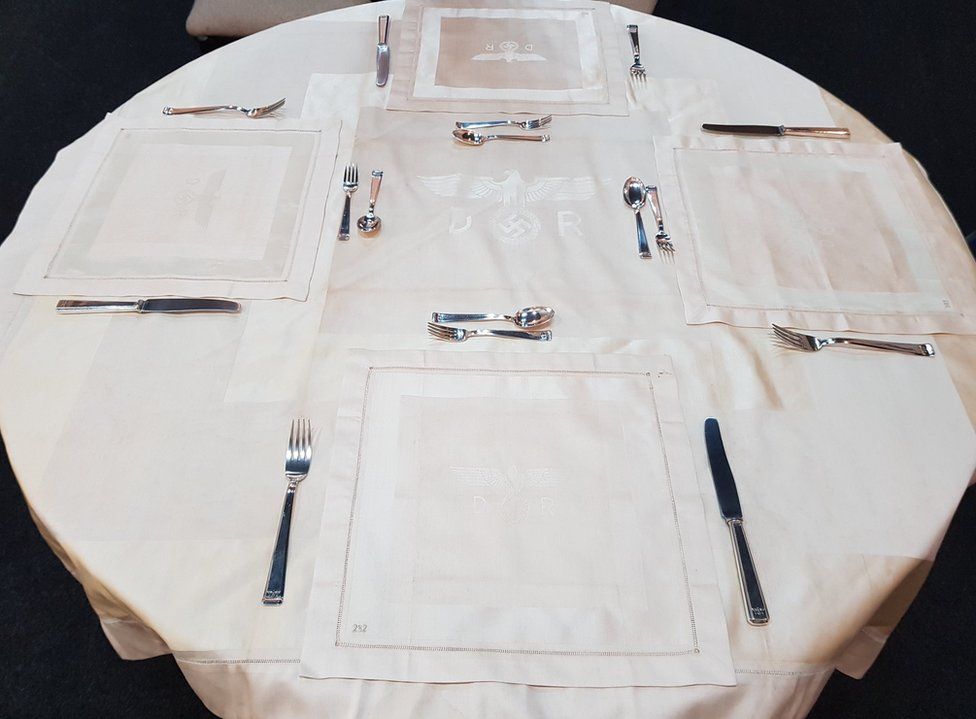Nazi memorabilia withdrawn from sale in Belfast
- Published

A Belfast auction house has cancelled the planned sale of Nazi memorabilia due to "sensitivities".
Swastika-emblazoned tableware from Nazi Germany was expected to sell for about £20,000 when bidding opened at Bloomfield Auctions on Tuesday evening.
But the items - reportedly produced for Adolf Hitler's 50th birthday - have been withdrawn following controversy.
Bloomfield Auctions managing director Karl Bennett said they would not sell similar items in the future.
He said: "In light of the sensitivities surrounding the items, we've taken the decision to withdraw the sale, and they will not be sold by this company in the future."
The move comes after a Jewish community leader described the planned sale as "sick".
Belfast Jewish Community chairman Michael Black said people "would feel uneasy" about the sale.
Bloomfield Auctions had earlier posted on Facebook about the "historically rare" items, including silver cutlery, tablecloth and napkins.
The post said the tableware was intended for use in a carriage that was to form part of Hitler's personal train just before the outbreak of World War Two.
'Uneasy'
The tablecloth, which was described as "probably the only one known to exist today", is embroidered with the letters "DR" for Deutsche Reichsbahn - German National Railway - and a swastika.
Four small napkins with similar embroidery form part of the collection.
The silver forks, knives and spoons in the collection feature the Deutsche Reichsbahn crest.
'Stamp out Nazi trade'
It is not illegal to sell Nazi memorabilia in the UK but such sales are banned in other parts of Europe, including in Germany and Austria.
Christie's, Sotheby's and Bonhams, three of the world's biggest auction houses, refuse to trade items connected to Nazi Germany.
Jewish leader Mr Black said it was the first time he had been aware of plans to auction Nazi memorabilia in Belfast.
"It's a bit sick when these things come up," he told BBC News NI.
"Most people would feel uneasy about something like this, whether they were Jewish or not.
"Nobody is breaking the law with this but the less oxygen these things get, the better."
The Campaign Against Anti-Semitism said the auction "plays straight into the hands" of groups that "fetishise relics like these".
"It is incumbent on auction houses to ensure that the trade in Nazi mementos is stamped out," added a spokesman for the campaign group.
"Instead of seeking to earn a commission, the auction house should have had regard for the survivors of the Holocaust and the families of its victims, who will be distressed and repulsed by this sale."
Loo roll and silverware
In 2017, Irish auction house Whyte's was criticised for its "tasteless" decision to sell items from the Third Reich period, including a Nazi sash.
Oliver Sears, who is the son of a Holocaust survivor and owns a gallery on the Dublin same street as Whyte's, said he thought it was "quite appalling".
But auctioneer Ian Whyte said he believed it was "a form of censorship to say collectors cannot collect what they like, provided it is legal".
Last year, cutlery made to celebrate Hitler's 50th birthday was sold at auction in England for £12,500.
The silverware was found during a house clearance in Dorset, having belonged to a senior military officer.
Toilet paper issued to the Nazi leader's army during World War Two went up for sale at an auction at Whyte's in Dublin in 2017.
The unopened roll of Edelweiss brand paper was valued at up to €120 (£103).
And an "extremely rare" signed copy of Adolf Hitler's Mein Kampf was sold at auction for £17,000 in Lancashire in 2017, far surpassing its £2,500 estimate.
The swastika-embossed 1935 edition bears the Nazi dictator's signature on the front fly leaf.
- Published7 April 2018
- Published7 September 2017
- Published5 September 2016